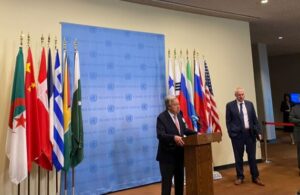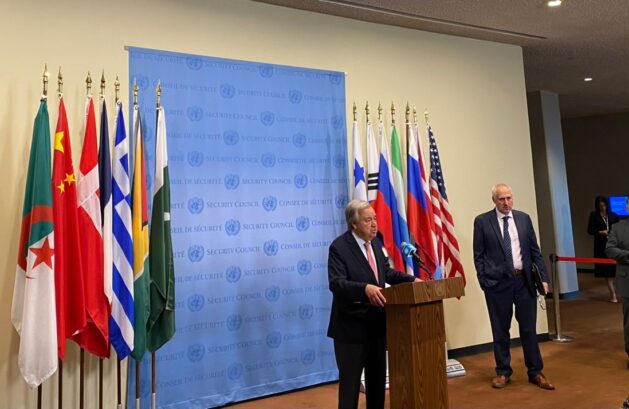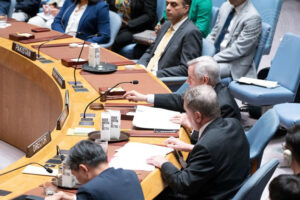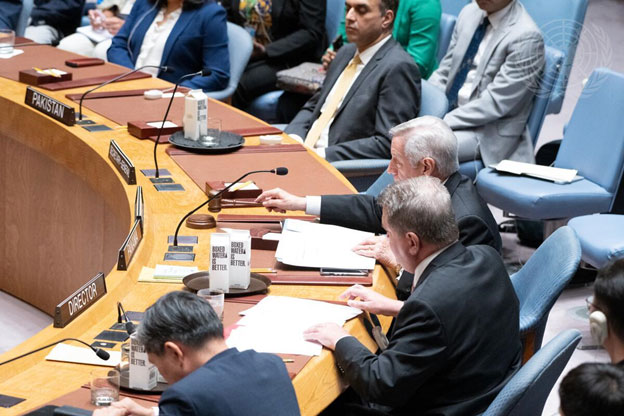
Armed Conflicts, Crime & Justice, Editors’ Choice, Featured, Freedom of Expression, Headlines, Human Rights, Humanitarian Emergencies, International Justice, Middle East & North Africa, Press Freedom, Sustainable Development Goals, TerraViva United Nations
As Israel escalates its attack on Gaza City, the UN moves to stop further violence and humanitarian violations by renewing UNIFIL’s mandate for the last time.

United Nations Secretary-General António Guterres at a press briefing on Israel’s plans to take over Gaza City. Credit: Jennifer Xin-Tsu Lin Levine/IPS
– Ahead of the Security Council meeting on the situation in the Middle East, United Nations Secretary-General António Guterres spoke to the press on the “unfolding tragedy that is Gaza,” calling Israel’s new plans to take over Gaza City with the military a “deadly escalation” and an “existential threat to the two-state solution.”
He warned that such a move could precipitate an unprecedented humanitarian catastrophe that imperiled any remaining prospects for negotiated peace.
The Secretary-General also reiterated his plea for an immediate ceasefire, emphasizing that capturing Gaza City would result in massive civilian casualties and widespread destruction—including severe impacts on the health sector already teetering on collapse.
At the daily press briefing, spokesperson for the Secretary-General Stéphane Dujarric reported on the displacement in Gaza since Israel’s most recent invasion, confirming the Secretary-General’s statements about refugees. UN experts report that the total number of people who have fled from north Gaza to south Gaza since August 14, when the Israeli invasion was announced, is 20,000.
The Secretary-General went on to address the most recent Israeli air strike on the Nasser Hospital in the southern Strip of Gaza, where at least 20 people were killed and 50 others were injured. Israel’s military defended the strike by asserting that it targeted a camera used by Hamas to surveil troop movements.
Dorothy Shea, United States ambassador to the United Nations, defended Israeli actions and urged condemnation of Hamas’ use of civilian facilities for military purposes. She also noted the Hamas members killed by the airstrike.
Prime Minister Benjamin Netanyahu issued a statement calling the strike a “tragic mishap” with no mention of a specific Hamas target. The Secretary-General called for an impartial investigation into these contrasting claims.
Although Netanyahu reaffirmed his respect for journalists on X, formerly known as Twitter, UNESCO reported at least 62 journalists and media workers killed in Palestine while working since October 2023. At least five journalists were killed in the Nasser air strike, according to World Health Organization Director Tedros Adhanom Gebreyesus.
At the Security Council meeting debating whether or not to renew the mandate for the United Nations Interim Force in Lebanon (UNIFIL), many representatives acknowledged Israel’s current military action and called UNIFIL’s work “vital” in maintaining borders, minimizing conflict and stabilizing tensions.
The representative for Algeria Amar Bendjama was critical of UNIFIL’s failures, but spoke in favor of the renewal. He said, “We must ask, has UNIFIL fulfilled its mandate? Clearly, the answer is no. Lebanese lines remain under Israeli occupation, and we regret that our proposal to include a clear reference to the 1949 general armistice agreement was not retained. Without ending Israel’s occupation of Arab lands, peace and stability in the region will remain elusive.”
UNIFIL was initially created in 1978 to oversee Israeli withdrawal from Lebanon. The mandate was adjusted and has played a significant role in maintaining Lebanese army control on the border between Lebanon and Israel rather than Hezbollah, a paramilitary organization, taking over. Critics, led by the United States, see the mandate as a waste of money that has helped Hezbollah consolidate power.
Dujarrac emphasized the necessity of all participating parties to respect UNIFIL’s mandate for it to successfully fulfill its promises.
The Council ultimately voted to renew UNIFIL’s mandate, with many members stressing that the mission continues to play an important role in preventing further escalation along the Israel-Lebanon border.
Guterres’s warnings on Gaza and the debate over UNIFIL underscored the overlapping crises in the region that face the Security Council.
As displacement in Gaza mounts and humanitarian needs continue to fester, UNIFIL’s renewal has bought time rather than answers for a region caught between humanitarian crisis and unresolved conflict.
IPS UN Bureau Report










